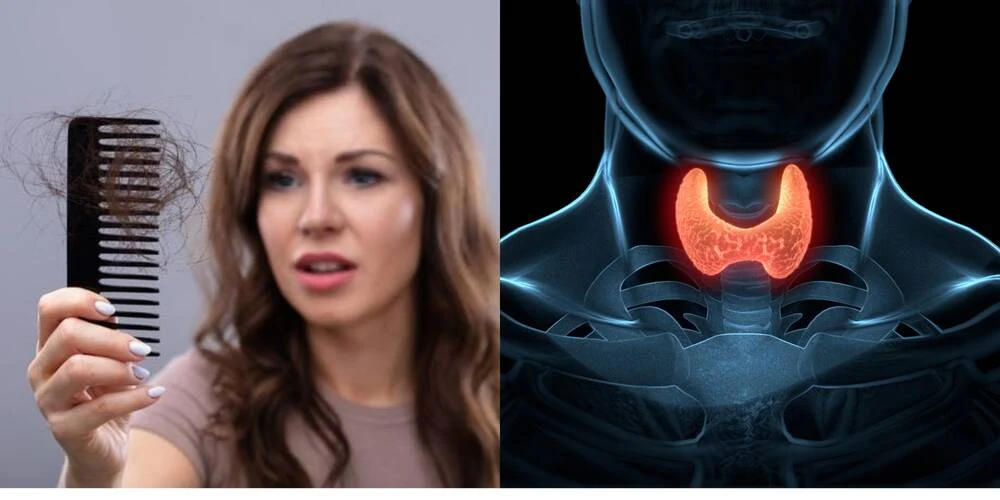Iodine is an essential mineral primarily obtained from seafood and iodized salt. It plays a critical role in thyroid hormone production, metabolism regulation, cellular repair, and overall growth. Yet, many people remain unaware of the risk of iodine deficiency.
Globally, nearly one-third of the population is at risk of insufficient iodine intake. Symptoms can range from subtle, easily overlooked signs to severe health complications. Recognizing these early indicators is key to preventing long-term effects.
12 Early Signs of Iodine Deficiency You Shouldn't Ignore
1. Hair Loss
Thinning hair or hair loss may indicate low iodine levels. Iodine is converted by the thyroid gland into hormones like thyroxine (T4) and triiodothyronine (T3), which are vital for hair follicle growth and maintenance.
Signs may include:
- Thinning hair on the scalp or eyebrows
- Slowed hair growth
- Increased shedding
2. Increased Sensitivity to Cold
Low thyroid hormone levels due to iodine deficiency can slow metabolism, leading to lower heat production. This may cause persistent cold intolerance, even in mild temperatures.
3. Irregular or Heavy Menstruation
Thyroid hormones regulate reproductive hormones. A deficiency can disrupt menstrual cycles, causing irregular periods or heavier-than-usual bleeding.
4. Weakness and Fatigue
Insufficient iodine can result in lower thyroid hormone levels, reducing energy production and causing persistent tiredness and weakness.
5. Neck Swelling
An enlarged thyroid, or goiter, may form when the gland overworks to produce hormones without adequate iodine. Symptoms include visible swelling at the base of the neck.
6. Decreased Concentration and Productivity
Iodine deficiency can impair cognitive function, leading to reduced focus, memory issues, and lower productivity at work or school.
7. Heart Rate Changes
Low thyroid hormone levels may cause a slower heart rate and low blood pressure, leading to dizziness, fatigue, and fainting.
8. Dry Skin
Thyroid hormones influence skin regeneration and hydration. Deficiency can result in dry, flaky skin and reduced sweating.
9. Throat Lumps or Choking Sensations
Enlargement of the thyroid gland may cause difficulty swallowing or breathing and a sensation of pressure in the neck.
10. Sudden Weight Gain
Slow metabolism caused by low thyroid hormones can lead to rapid, unexplained weight gain.
11. Pregnancy Complications
Pregnant individuals require higher iodine intake. Deficiency can cause maternal fatigue, goiter, and hinder fetal brain development and growth.
12. Memory and Learning Difficulties
Iodine deficiency can affect brain function, leading to poor memory retention and learning challenges due to reduced thyroid hormone activity in the brain.
FAQ – Early Signs of Iodine Deficiency
What are common early signs of iodine deficiency?
Early signs include hair loss, increased sensitivity to cold, irregular or heavy menstruation, weakness and fatigue, neck swelling, decreased concentration, heart rate changes, dry skin, throat lumps or choking sensations, sudden weight gain, pregnancy complications, and memory or learning difficulties.
Why does iodine deficiency cause hair loss?
Iodine is converted by the thyroid into hormones like thyroxine (T4) and triiodothyronine (T3), which are essential for hair follicle growth and maintenance. Low iodine can slow hair growth and increase shedding.
How does iodine deficiency affect metabolism?
Low iodine levels reduce thyroid hormone production, slowing metabolism. This can cause fatigue, weight gain, cold intolerance, and reduced energy production.
Can iodine deficiency impact pregnancy?
Yes. Pregnant individuals need more iodine to support fetal growth and brain development. Deficiency may cause maternal fatigue, goiter, and impair fetal cognitive development.
How can I prevent iodine deficiency?
Consume iodine-rich foods such as seafood, dairy products, and iodized salt. Regular checkups and awareness of deficiency signs help prevent long-term complications.
References
- National Institutes of Health (NIH) – Office of Dietary Supplements. “Iodine.” https://ods.od.nih.gov/factsheets/Iodine-Consumer/
- Mayo Clinic. “Iodine deficiency.” https://www.mayoclinic.org/healthy-lifestyle/nutrition-and-healthy-eating/expert-answers/iodine-deficiency/faq-20058511
- Harvard T.H. Chan School of Public Health. “Iodine.” https://www.hsph.harvard.edu/nutritionsource/iodine/

Comments